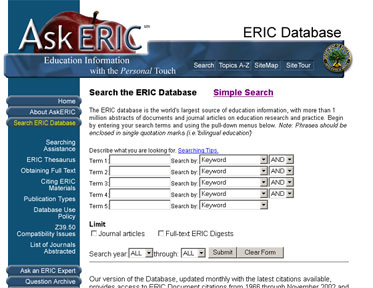Technology is a wonderful thing. Reference is near
and dear to the hearts of information professionals. Meshing the two
of them would seem to be a dream come true. You might even believe
that it's possible after looking at AskERIC.

AskERIC provides many services, mainly focused toward
the education industry. It has a virtual reference service (questions
are answered within 2 business days or if you're in a hurry you can
chat with a librarian between 1-4pm ET), a resource collection that
includes 3000 links to websites and organizations, an archive of some
answers from past questions, 2000 lesson plans submitted by teachers,
a link to the ERIC database, and an archive of over 25 education-related
discussion groups. Sounds like a one-stop, self-serve education reference
center.
What more could you ask for?
The amount of information is phenomenal… or
is the word overwhelming? It sounds like you should be able to find
anything you might need, if you ask the right question. And, of course,
if you have money.
Money?
Well, a number of the resources on the page appear
prepared to provide information, but when you actually get there,
you find it has a price tag. Getting articles from the ERIC database
is fee-based - you can either join their E*Subscribe program or get
your credit card ready. Were you interested in looking at lesson plans
for Chinese language? Only one is listed, and unless you purchase
the $34 CD, it isn't much use.
So, to get information from AskERIC you need:
- the ability to ask the right question
- information available in the right form already
(unless you can wait two days or are available during the chat time)
- and you have to have the financial resources.
All of this would sound pretty daunting to me if
I were an overworked teacher, or a 10th grader who needed my report
done as soon as possible.
Does this mean AskERIC is a terrible resource? Of
course not! But it does mean that even a well-planned and supported
resource like this can have hidden pitfalls for the unwary user.
The point is that technology doesn't negate the need
for human mediation of information. AskERIC brings together wonderful
resources - if you know how to use them, if you know where to go when
you hit the access/money barrier. AskERIC, like any reference source,
needs to be supported by other resources.
Like reference librarians (remember that 1-4pm ET
chat?).
The important thing for information professionals
to remember is that even the best resources have limitations. This
means we need to be aware when we send a user to AskERIC what barriers
they may stumble into and be prepared to help them past those points.
(It might just be that the library holds that journal with the article
they need.)
We can't just send people to the computer to do it
themselves. Information professionals must step forward and become
advocates of technology being a tool for reference rather than a substitute.


